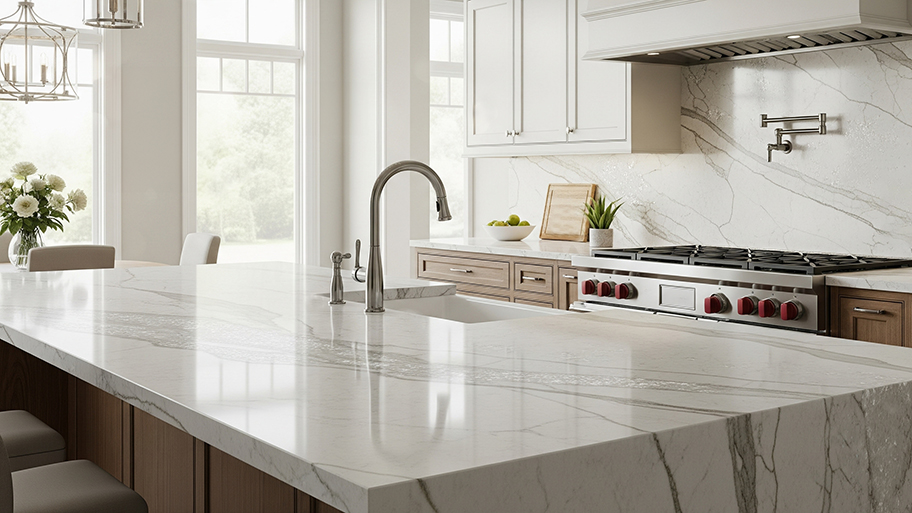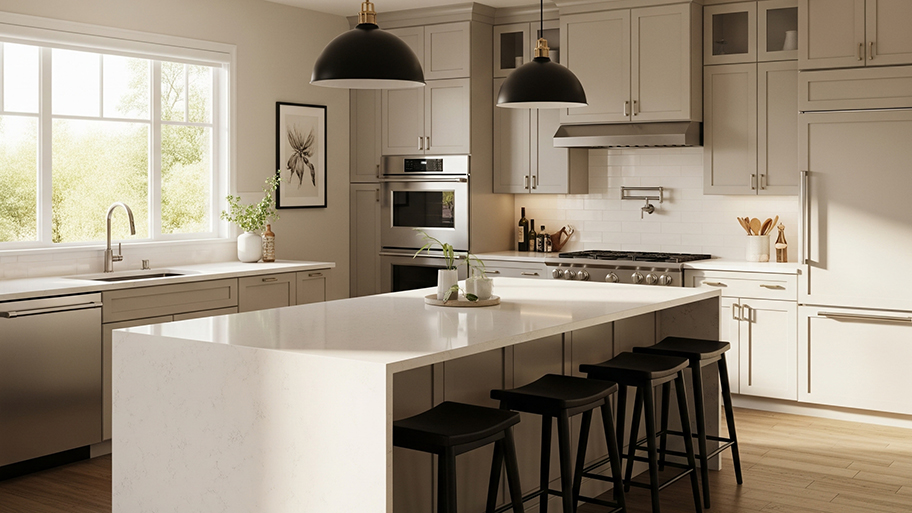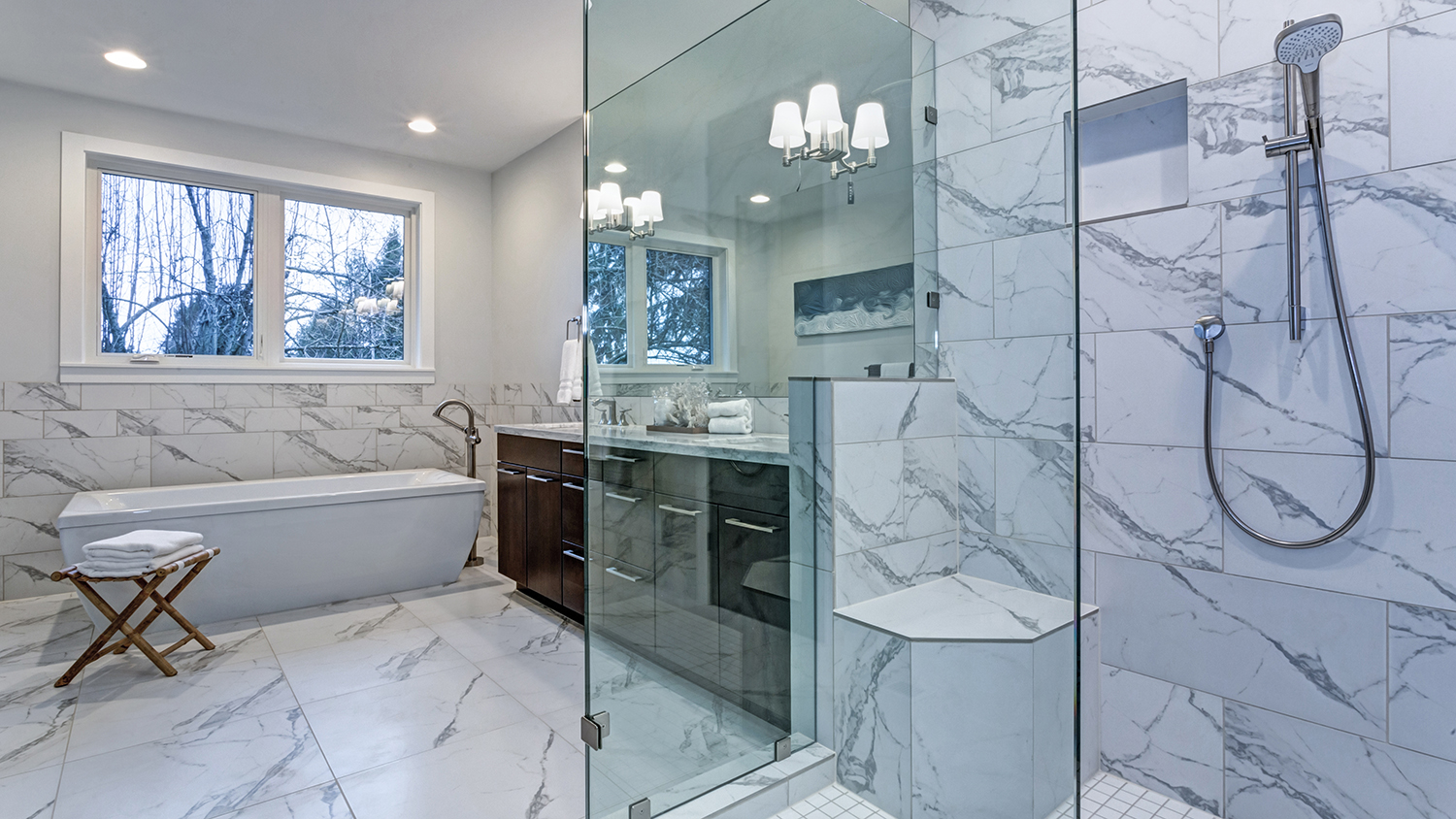
How much your quartzite countertops will cost depends on a number of factors—most prominently, the type of quartzite and the size of your counters.
Don’t get stuck between a rock and a hard place when choosing tile for your home


Both marble and porcelain are durable materials that can last decades.
Porcelain is harder, stronger, and generally more affordable.
Marble is a luxury natural stone that can add value to your home.
You cannot get more classic than marble or porcelain tile. There is a reason why these highly durable materials have remained popular since ancient times, from the early porcelain of the Chinese Tang Dynasty to the marble in the Greek Parthenon.
These materials may carry some of the same benefits, but do not be fooled. They are very different once you (figuratively) crack the surface. From luxe bathroom flooring to decorative kitchen countertops, this guide will help you compare marble vs. porcelain tile.
Though both types of tile are made from natural materials (porcelain comes from clay, while marble is a natural stone), there are a few key differences. Porcelain is more affordable, more versatile, lower maintenance, and generally more durable. Marble has a higher resistance to cracks, is easier to install, and adds more value to your home. Plus, you cannot beat the classic veining, though you can imitate it.

Marble is a metamorphic rock that forms naturally when limestone is exposed to high heat and pressure. This process makes the softer limestone much harder and less porous—exactly the qualities you would want in kitchen or bathroom tile. The coveted veining, the hallmark of the stone, is typically the result of impurities like iron oxide, sand, silt, and clay.
Marble comes in all kinds of different varieties. The classic is white marble with subtle gray veining, but you can find a range of shades from beiges and grays to pinks and blues to black.
| Pros | Cons |
|---|---|
| Highly durable | Requires regular sealing due to porosity |
| Luxury look | Can stain, discolor, etch |
| Heat resistant | High cost, especially rare types |
| Unique appearance | Can chip or crack |
| Lots of colors and styles | Not typically suitable for outdoor use |
Best for:
Statement features like fireplaces or luxury countertops
Homeowners who want a natural stone rather than an imitation
Those who like the elegant and classic look of marble
The biggest draw of marble is the high-end look. It is classic but oozes luxury, especially marble tile bathrooms and kitchen countertops. Each stone is truly a unique work of art right from the brush of Mother Nature.
On top of that, marble tiles are highly durable. They can last 20 to 50 years with proper maintenance, and if a tile does crack or chip, you can easily swap it out. It is also one of the best materials when it comes to heat resistance. It can usually withstand a hot pot or pan, though you should always use a trivet because repeated exposure can damage the marble over time.
Being a natural stone, marble is porous. This inherently makes it higher maintenance than other types of countertops. It can easily stain if you spill a liquid. It is particularly vulnerable to etching from acidic solutions, so avoid harsh acidic cleaners. Even slightly acidic tap water can cause water spots. To mitigate this issue, you will need to seal marble tile regularly.
Though marble tile is extremely durable, it can crack or chip under impact. The price is also prohibitive. While marble tile is more affordable than a slab, it is still a high-end product that comes with a high-end price tag. On top of that, you may need to reinforce your flooring or cabinets to support the heavy weight of the stone, which adds to installation costs.

Porcelain falls under the category of ceramics. It is made primarily from refined clay mixed with other natural materials like feldspar and quartz. These materials are fired in a kiln at high temperatures, sometimes even exceeding 2,500 degrees Fahrenheit. The result is an extremely hard, nonporous, and heat resistant product, which is why it is used everywhere from bathroom sinks to kitchen bowls. It is far more durable than its cousin, ceramic tile.
| Pros | Cons |
|---|---|
| Extremely durable and scratch resistant | Can chip or crack |
| Heat resistant | Difficult to cut and install |
| Nonporous, holds up well to water | Heavy, may require reinforcement |
| Low maintenance | Higher cost compared to other tile materials |
| Large range of options | Less resale value than natural stone |
Best for:
High-traffic areas or high-use countertops
Outdoor patios, pool decks, and other areas exposed to water
Homeowners who prefer low maintenance surfaces
Porcelain tile shines with sheer durability and versatility. This material is scratch resistant and stronger than natural stone. Thanks to the firing process, it is so heat resistant that it can handle hot pots and pans. It is also nonporous. You can easily wipe up spills without the fear of staining, though you will need to seal the grout.
Though porcelain is very durable, it can crack or chip if you drop a heavy object. The hardness and weight makes it difficult to install, so if you choose this material, it is best to hire a tile contractor near you. You should also avoid using harsh acid-based cleansers that contain ammonia or bleach, since they can discolor the surface (unless, of course, your porcelain is already white).
There are a few things to keep in mind when choosing marble or porcelain tile for bathrooms, kitchens, and other areas of the home. These are both excellent materials that have different strengths. Your choice should depend on your taste, lifestyle, and budget.
When it comes to appearance, it depends on what you like. Most people think marble has a higher-end look. The veining is particularly desirable, but porcelain tile can come with gorgeous decorative patterns that you cannot get with marble. There are even ultra-glossy options reminiscent of glass tiles. Your overall choice should depend on your preferred design style.
Both marble and porcelain tile come in a variety of colors and finishes. Since marble is a natural material, options are limited to whatever is dug up in a quarry. Color and veining does vary, but it cannot compare to the sheer variety of porcelain.
Porcelain comes in just about any color under the sun, including various decorative patterns, glass-like mosaic tiles, and quirky penny tiles. Porcelain can even mimic wood, concrete, marble, and other natural stones; it all depends on the glaze.
Both porcelain and marble are highly durable, but marble is slightly more prone to scratches, staining, and marks because of the porosity. Porcelain also has higher heat resistance, thanks to the firing process in which it is created. It can hold up to hot pots and pans without damage.
The only flaw in durability is when it comes to cracks and chips. The same hardness that gives porcelain its strength also makes it brittle. It is more likely to crack if you drop a heavy object. For long-term durability, it is important to purchase a tile with the proper PEI rating. Any rating above three should hold up as flooring that receives regular foot traffic. If you are looking to install porcelain bathroom tile, keep lower grades on shower walls.
Price is perhaps the biggest difference between porcelain and marble tile. Porcelain is usually more affordable, but it depends on the quality of either material. Typically, porcelain tile costs $5 to $50 per square foot, including materials and labor. Marble tile, on average, costs $8 to $30 per square foot, but high-end or rare varieties can cost up to $350 per square foot.
Tile is generally easier to install than a porcelain or marble slab. That said, porcelain tile is typically a little more difficult to DIY than marble tile because it is harder and more difficult to cut. You will also need a professional installer to evaluate whether or not your home can support the added weight of porcelain or marble and to reinforce areas if necessary.
The exception is peel-and-stick porcelain tile. This renter-friendly option is generally considered lower quality, but it is a simple (and temporary) DIY for homeowners looking for a change on a budget.
Because marble is porous, it requires more maintenance than porcelain. You will need to seal the surface regularly. You will also need to clean up spills promptly, especially of acid-based or highly pigmented liquids, to avoid staining. That said, you may have to seal your grout regardless of the type of tile for similar reasons.
Either surface requires regular cleaning and repairs, but typically, repairs are as simple as swapping out a damaged tile.
Porcelain tile generally lasts longer than marble tile, but either of these materials can last for decades with the proper care. On average, you can expect marble tile to last for at least 25 years (though 50 years is not unheard of with careful maintenance). Porcelain tile will typically last around 50 or 60 years.
Both marble and porcelain are made from natural materials and generally considered eco-friendly compared to surfaces that contain petroleum-based products, such as laminate, which can off-gas volatile organic compounds (VOCs), and engineered stone, which was recently banned in Australia.
That said, neither are perfect. Porcelain is made through a very energy-intensive process, which does emit carbon dioxide. Marble is mined from quarries, which is energy intensive and can contribute to issues like deforestation and pollution. Both materials are recyclable.
One of the more important things to note about porcelain vs. marble is the resale value. Marble is typically considered a luxury product and may be more attractive to potential buyers (at least if it is in good condition). Porcelain is a sturdy and reliable option, but generally will not increase value.
From average costs to expert advice, get all the answers you need to get your job done.

How much your quartzite countertops will cost depends on a number of factors—most prominently, the type of quartzite and the size of your counters.

The cost of porcelain countertops is affected by many factors, primarily the material's type (tile or slab) and finish, as well as your counter’s size and shape.

New quartz countertops can give any kitchen a facelift. Find out quartz countertop costs, including quartz slab prices and the cost of installation.

Quartz countertops can complement just about any kitchen design, but how long do quartz countertops last? Here’s everything you need to know.

Discover the true cultured marble cost for your next project. Learn about installation, size, labor, and ways to save on cultured marble.

If you’re considering a kitchen remodel, you may wonder, what are quartz countertops? Learn everything you need to know to make a decision here.